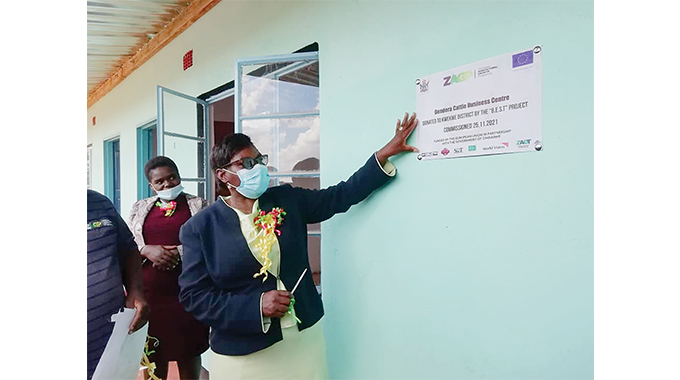‘One-Stop-Shop’ HIV and Aids facilities key in ending Aids by the year 2030

Gibson Mhaka, Senior Features Reporter
AS Zimbabwe today joins the rest of the world in commemorating the World Aids Day, it is important to note that in order to achieve the global objective of ending Aids by 2030, there is a need for all public health centres to adopt the “One-Stop-Shop” HIV and Aids facility.
The facility integrates different services under one roof by the same health provider such as HIV testing and counselling, cancer screening, provision of Antiretroviral Therapy (ART), Prevention of Mother-to-Child Transmission (PMTCT), family planning consultation and adherence support under one roof.
Under this model all these services can be accessed by People Living with HIV and Aids (PLWHA) at the same hospital or clinic and can be effective in reducing barriers to retention and adherence. Other important components include access to HIV experts, quality improvement measures, integration of electronic records and financial sustainability of the model.
Service integration is also important because it provides more comprehensive care to the patients, improves patient adherence to treatment when multiple interventions are required, avoid missed opportunities for key interventions and minimises patients being ‘‘lost’’ in the system and makes visits more efficient for the patient and the clinical team, particularly at health centre level.
In Zimbabwe where an estimated 1,4 million people are living with HIV, a non-profit organisation AIDS Healthcare Foundation (AHF) Zimbabwe is supporting the Ministry of Health and Child Care in establishing Centres of Excellence (COE’s) with One-Stop Shop HIV and Aids facilities which provide quality and affordable health services to PLWHA with complex medical conditions who are referred from across the country.
The COEs are currently being established at the central and or referral hospitals in the country.
As part of its mission in assisting PLWHA with an entire spectrum of care, AHF Zimbabwe has so far supported the establishment of two centres namely Parirenyatwa Centre of Excellence in Harare and Mpilo Centre of Excellence in Bulawayo.
AHF is a Los Angeles-based and non-profit organisation which is providing cutting-edge medicine and advocacy to more than 1,5 million people in 45 countries; Africa, North and South America, Asia and Europe.
It is currently the largest provider of HIV and Aids medical care in the US.
Addressing journalists during a recent media tour of the Mpilo Centre of Excellence, the facility’s medical director Dr Nkazimulo Tshuma welcomed the One-Stop Shop HIV and Aids model saying by integrating a full suite of reproductive health care together with a full range of HIV services — including prevention, testing and antiretroviral treatment — health workers have more opportunities to provide both kinds of care.
The tour was meant to familiarise the media personnel with the actual environment and adequate information to assist in dissemination of HIV-related information.
“Mpilo Opportunistic Infections (OI) Clinic now called Mpilo Centre of Excellence, was opened in 2004 and it has a total population of about 10 300 patients and out of those we have paediatric adolescents making up to about 2 400 patients.
“In 2007 Aids Health Care Foundation joined this facility to support it and collaborate activities together with the Ministry of Health and Child Care.
AHF came in with SRH support so which means it supports doctors who work here, support for counsellors, support for the prevention team those who follow up and track patients.
There is also support for pharmacists, for lab scientist and a lab technician,” said Dr Tshuma.
She said in terms of infrastructure, there were a lot of renovations that were done by AHF Zimbabwe.
“There was no laboratory based here so we now have a lab on site courtesy of AHF Zimbabwe. The pharmacy was renovated and many other developments were done, so this is what AHF did in a nutshell”.
She adds: “The services that we offer here are HIV testing and counselling, Art initiation follow-up, we also follow up in terms of viral load monitoring, we also do other tests to support the management of our patients which are not really HIV tests.
We also screen for cervical cancer and TB and we have support for hypertension medicines such as diabetic medicines”.
National Aids Council (Nac) chief executive officer Dr Benard Madzima hailed AHF Zimbabwe saying their services were a critical tactic in the fight against the country’s devastating HIV epidemic.
“The National Aids Council and the Aids Healthcare Foundation have always worked hand in glove in the prevention, treatment, management of HIV as well as advocacy issues.
There is need to revamp our health facilities in all parts of the country so that we have a set up where people can come and get assisted at one place after having to travel long distances to get help.
District hospitals have to be able to offer all services for HIV and Aids patients just like at referral hospitals.
We, therefore, urge relevant stakeholders to work towards facilitating such facilities in hospitals,” said Dr Madzima.
The One-Stop Shop model would also help to increase women’s access to life-saving maternal health care and family planning.
It also meant that they would no longer have to return time and again for different sexual and reproductive health services.
AHF country programme manager, Dr Enerst Chikwati said their partnership with the Ministry of Health and Child Care was permanent, pledging the foundation’s full support in any initiative that leads to the attainment of the global agenda of ending new infections by 2030.
“AHF has a commitment to sustainability and therefore works closely with the Government in programme implementation in order to align with national HIV strategic plans and strengthening existing public HIV services.
“We have since partnered with the Ministry of Health and Child Care in setting up centres of excellence in HIV care and treatment. To date we have done Mpilo, Mutare Provincial Hospital and Parirenyatwa for patients with complex HIV-related conditions and assisting the Government in treatment, prevention and research.
We have also extended our support to Mutare Provincial Hospital and we have also managed to construct a state-of-the-art facility at Gweru Provincial Hospital,” he said.
Dr Chikwati said they have also partnered with local authorities in Harare (Glen View and Mabvuku Polyclinics) and Bulawayo (Mzilikazi and Cowdray Park clinics) as a way of providing care to more people within the catchment area of the two cities.
It is also important to note that since this model integrates different types of services for people who are living with HIV and Aids, organisations should promote the importance of teamwork, consider specific staff competencies and facilitate training.
Cultural and linguistic considerations should also be taken into consideration as programmes would need to make sure that the services and materials are accessible and understandable.
Although Zimbabwe is among the countries in sub-Saharan Africa most affected by the HIV and Aids epidemic, it has made great strides towards controlling HIV and Aids after reaching the 90-90-90 targets set by UNAIDS for 2020.
This year’s World Aids Day is celebrated under the theme: “End Pandemics, End Inequalities, End Aids.”








Comments